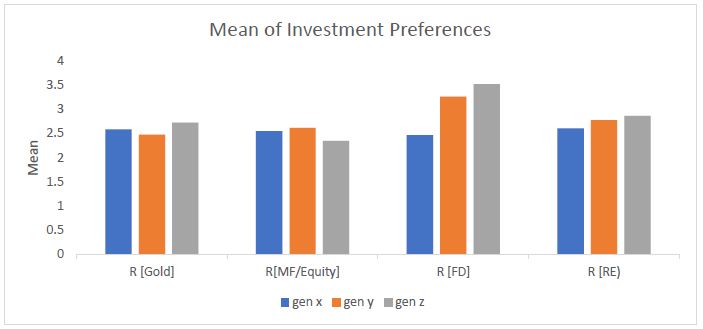Comparative Analysis of Investment Behaviour: Exploring Investment Patterns and Decision-Making between Generation X, Generation Y, and Generation Z
DOI:
https://doi.org/10.5281/zenodo.10937791Keywords:
financial proficiency, investment behaviour, investment decisions in gen x, investment decisions in gen y, investment decisions in gen zAbstract
This research paper compares investment behaviours among Generations X, Y, and Z in Bengaluru, India, focusing on investment choices, amounts, and periods and utilising mixed methods. The study examines investment behaviour as a function of risk tolerance, financial literacy, investment choices, technological dependency, and retirement planning. A total of 301 participants from various backgrounds participated in the study, with data analysed using ANOVA tests and post hoc LSD tests to identify significant differences between generational cohorts. SPSS and MS Excel were employed for statistical analysis.
The findings of this study are significant, revealing that while there were no statistically important variations in financial proficiency among the generations, Generation Z displayed the highest average scores. This underscores the importance of ongoing financial education initiatives targeted at younger individuals. Additionally, Generation Z exhibited the highest risk tolerance, followed by Generation Y and Generation X, indicating a propensity for riskier investment options among younger generations. Despite rapid technological advancements, there were no notable differences in technology dependency across generations, suggesting a consistent impact of technology on investment behaviour across age groups.
Significant differences were observed in retirement investment propensity, with Generation Y showing a higher inclination towards retirement investment than Generation X. However, no notable difference was seen between Generation Z and either Generation X or Y, emphasising the importance of long-term financial planning, particularly among younger generations. Furthermore, the study highlights a correlation between financial proficiency and risk appetite, with higher literacy levels associated with increased risk-taking behaviour.
Analysis of investment preferences reveals that Generation Z prefers Mutual Funds/Equity, Generation X favours Real Estate and Fixed Deposits, and Generation Y leans toward Gold. These preferences reflect the perceived stability, inflation-hedging properties, and cultural significance of the chosen investment avenues.
Downloads
References
Ashfaq, M., Shafique, A., & Selezneva, V. (2024). Exploring the missing link: Financial proficiency and cognitive biases in investment decisions. Journal of Modelling in Management, 19(3), 871-898. https://doi.org/10.1108/JM2-11-2022-0266.
Brown, T. (2018). The importance of long-term investing. Journal of Finance, 25(3), 45-60.
Chowdhary, M. (2020). An analysis of the familiarity bias. Financial literacy and its interaction with alternate investment behaviour. https://theses.ubn.ru.nl/handle/123456789/9715.
Elango, D.., Ajah, S. N., & Shah, J. (2023). Factors influencing investment intention among gen Z: The antecedent of India. Interdisciplinary Research Review, 18(3). Retrieved From: https://ph02.tci-thaijo.org/index.php/jtir/article/view/247505.
Erwin, Erwin & Saununu, Siska, & Rukmana, Arief. (2023). The influence of social media influencers on generation Z consumer behavior in Indonesia. West Science Interdisciplinary Studies, 1, 1028-1038. doi:10.58812/wsis.v1i10.317.
Gurbaxani, A., & Gupte, R. (2021). A study on the impact of covid-19 on investor behaviour of individuals in a small town in the state of Madhya Pradesh, India.
Henager, R., & Cude, B. J. (2016). Financial literacy and long- and short-term financial behaviour in different age groups. Journal of Financial Counseling and Planning, 27(1), 3-19.
Kapoor, J. R., Dlabay, L. R., & Hughes, R. J. (2020). Personal finance. McGraw-Hill Education.
Madan, A., Lohani, V. J., Gupta, P., & Rai, P. (2023). Impact of covid-19 pandemic on investment behaviour: A study of retail investors in India.
Meyyammai, M., & Vinotha, K. (2022). A study on investment preference among gen x, millennials, and gen z with special reference to Chennai city. Madhya Bharti, 82(01). Available at SSRN: https://ssrn.com/abstract=4447190 or http://dx.doi.org/10.2139/ssrn.4447190.
Mochammad Rizaldy Insan Baihaqqy, & Sugiyanto. (2020). Investment decisions of investors based on generation groups: A case study in Indonesia stock exchange. Coopetition: Jurnal Ilmiah Manajemen, 11(3), 189–196. https://doi.org/10.32670/coopetition.v11i3.136.
Mohta, Anu, & V, Shunmugasundaram. (2023). Moderating role of millennials' financial literacy on the relationship between risk tolerance and risky investment behavior: evidence from India. International Journal of Social Economics, 51. doi:10.1108/IJSE-12-2022-0812.
Montier, J. (2007). Behavioural investing: A practitioner’s guide to applying behavioural finance. John Wiley & Sons.
Patil, Y., & Gokhale, R. (2022). Investing in the age of millennials and gen-z: A comparative analysis. NLDIMSR Innovision Journal of Management Research, 6(2), 15-28. https://doi.org/10.31794/NLDIMSR.6.2.2022.15-28.
Rodrigues, C.G., & B.V., G. (2024), Financial risk tolerance of individuals from the lens of big five personality traits – a multigenerational perspective. Studies in Economics and Finance, 41(1), 88-101. https://doi.org/10.1108/SEF-01-2023-0013.
Rosdiana, Riska. (2020). Analysis of investment interests motivation, social environment, financial literacy (Comparative study of generation z and millennial generation).
Smith, A., & Johnson, B. (2020). Understanding long-term investing strategies. Investment Review, 12(2), 110-125.

Downloads
Published
How to Cite
Issue
Section
License
Copyright (c) 2024 Rohit Mammen Thomas, Sujith Nair, Mukalel Johns Benny, Dr. Sheril Michael Almeida

This work is licensed under a Creative Commons Attribution 4.0 International License.
Research Articles in 'Management Journal for Advanced Research' are Open Access articles published under the Creative Commons CC BY License Creative Commons Attribution 4.0 International License http://creativecommons.org/licenses/by/4.0/. This license allows you to share – copy and redistribute the material in any medium or format. Adapt – remix, transform, and build upon the material for any purpose, even commercially.









